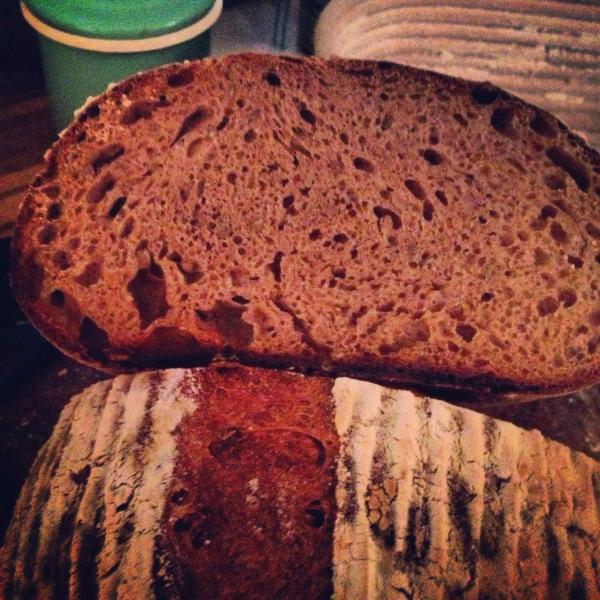While combing through odds and ends in my grain cupboard—and whilst keeping in mind my dark rye starter was getting low and I was out of said dark rye flour—I thought it might be nice to use a barley soaker.
The formula is nothing special, except for a very small amount of rye starter for the levain and my thought that it might be interesting to use the remaining water left over from the soaker in the final build. I think I may have under estimated how much kick my rye starter actually has, given the big oven spring the loaf had—even with 24 hours of proofing (the last 4 atop a warm oven).

Preferment
120 g whole wheat flour
90 g tepid water
10 g rye starter @ 100% hydration
Soaker
50 g pearl barley
1 cup boiling water (approx. 240 g)
Preferment and soaker were both left out at room temperature (roughly 65 F / 18.3 C) for 12 hours.
Final Dough
All of the preferment
300 g water (tap and water not absorbed by barley soaker)
15 g molasses
100 g whole wheat flour
300 g bread flour
11 g salt
Water and molasses were mixed with the preferment and then added to the remaining flours. The dough was then left to rest for 30 minutes. After resting it was kneaded for 5 or so minutes and then the salt and barley were added. I have no good method for adding in whole grains—or nuts or raisins for that matter. I spread out the dough as if I were to give it a good stretch and fold and then spread the barley across the top. Then, I rolled the dough up and kneaded it: if my hands have different speed settings, this would have to be considered a low setting. And each time a grain of barley popped out of the dough, I diligently—if not altogether Quixotically—poked it back into place. Once the barley appeared to be integrated into the dough I formed it into a boule and placed it into a lightly oiled bowl.
Stretch and folds were done to the dough at 30 and 60 minutes. The total bulk fermentation time was 2 hours 30 minutes.
At the end of fermentation I turned the dough out, pre-shaped it for my oval banneton and let it rest for 20 minutes. After the rest, the loaf was shaped, dusted with flour and parked in the banneton. The banneton then went into the fridge for a nice and long 20 hours.
After 20 hours the bread was removed from the fridge and placed atop a warm oven for 4 hours to finish proofing and come to room temperature (on low while breakfast was being prepared, then the oven was cranked up to prepare for the bake).
The bread baked at 500 F with steam for 15 minutes and then another 25 minutes without steam at 450 F.

The bread has a good wheaty taste with a slight sweet-pungency added by the molasses. The smell is definitely molasses as well, but not quite to the level of sticking your nose in the molasses jar. I cannot say I can taste the barley, but the grains do give it a nice textural surprise.
Scott
- tsjohnson85's Blog
- Log in or register to post comments
Great looking hearty bread Scott. Your crumb looks nice and open with a nice chewy thick crust.
Very nice bake.
Ian